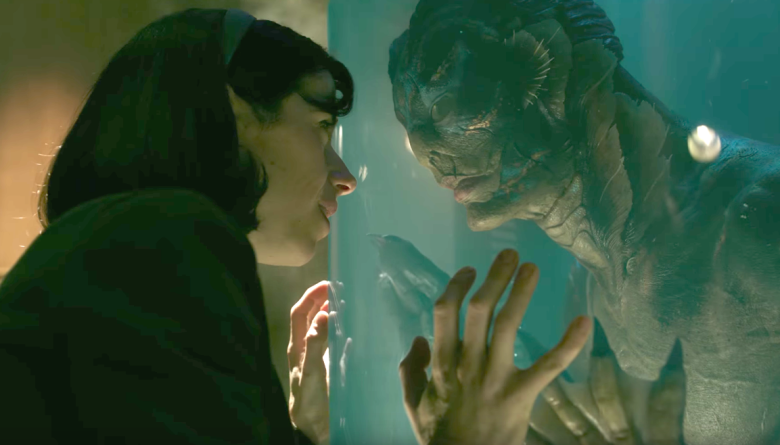The Shape of Water
Directed by Guillermo del Toro
Starring Sally Hawkins, Octavia Spencer, Michael Shannon, Michael Stuhlbarg, and Doug Jones.
Reviewed by Michael Dalton
[rating: 3/5]
Were Peter Jackson, the Oscar-winning director of fables like Lord of The Rings and Heavenly Creatures still operating at the height of his powers, Guillermo del Toro might have competition in the arena of the fantastic. As it stands, and now established with a resounding splash, del Toro has none. His latest film The Shape of Water, an award season favourite (and to see it is to realise how wide open the voters’ eyes must be), is a horror-musical-fantasy-race-against-time love story hybrid like no other. It isn’t a perfect film but it is a marvel. To call it del Toro’s love letter to cinema, as was Martin Scorsese’s Hugo before it, is to suggest it wallows and even lays back on the moments we remember and while del Toro borrows liberally, he justifies every inclusion. What he does manage to do, while giving us hope in this depressing superhero fuelled era, is remind us of why we’ve often been mesmerized by the dream factory. For lovers of pure cinema, The Shape of Water will feel like home.
You may have trouble shaking the feeling that the film is projected only as a visual feast, a far-reaching demonstration of its creator’s dark imagination. The stunning opening and closing underwater sequences are designed to ease us in and out (had Andy Muschietti’s It not featured the tagline “You’ll Float Too” it would’ve been perfect here) and the story at its centre, about a mute woman who falls in love with a captive amphibious creature and determines to rescue it, is a bracing one. No other original screenplay this past year has had a better hook. It’s shaded with bows to the classic era of cinema complete with a nod to immortal musicals (The film’s timeframe is never designated but my guess would be 1960 as a cinema below the heroine’s apartment is screening “The Story of Ruth”), populated with characters that run the gamut from villainous to adoring, and bolstered by an evocative production design by Paul D. Austberry and score by Alexandre Desplat. Even the heroine herself, the mute Eliza, played to glowing perfection by Sally Hawkins, is named after a famous screen character that needed to learn to speak all over again, but unlike Miss Doolittle, this Eliza, tough and wise, is infinitely more in touch with herself, literally. Running on a strict routine from morning to night (she sets an egg timer for her quick self-gratification ritual), she sees to it her lonely neighbour Giles (Richard Jenkins) is cared for and then joins her co-worker Zelda (the wonderful Octavia Spencer) for janitorial duties at a scientific institute.
The story revs up when she discovers, in a laboratory she cleans, a new resident. Looking for all the world like one of horror cinema’s greatest icons, a creature from a certain lagoon (embodied here by Doug Jones), he and Eliza bond after she feeds him some eggs and they develop a form of communication. To go any further with the narrative development would be unfair but it’s enough to know, the creature’s arrival sets in a motion a chain of unstoppable events. Lurking in the corridors of the institute is security chief Strickland (Michael Shannon) whose professional future depends on the creature’s fate and Dr. Hoffstetler (Michael Stuhlbarg) whose curious and nearly mute relationship with Eliza is the film’s most intricate element.
He’s blessed the production with a great set of players and every one fits accordingly but del Toro, most notably with the vile Strickland, seems unaware of animal control. Strickland is so devoted to his unsavoury duties he becomes a one-note monster (perhaps a too on the nose nod to slobbering demons of old) to the point that he becomes intolerable. Few actors today can freeze a scene with their forehead and Shannon is plum casting. Armed with an electric prod, cracking candy in his fangs, and even promising Eliza he could make her squeal given half a chance, Strickland is the overpowering embodiment of evil. If only del Toro had kept him more in the shadows, where all our nightmares live, the film would’ve been a wowser.




